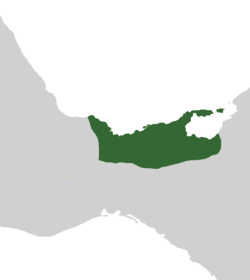Tabasco (former state)
| Tavasco | ||||||||||||
|
||||||||||||
|
Tabasco at its greatest extent, 1513-1519 (green).
|
||||||||||||
| Capital | Potonchán | |||||||||||
| Languages | Yoko Ochoco | |||||||||||
| Religion | Maya Religion | |||||||||||
| Government | monarchy | |||||||||||
| Halach Uinik | ||||||||||||
| • | 12th century | Unknown revolutionary | ||||||||||
| • | ?–1519 | Tabscoob | ||||||||||
| History | ||||||||||||
| • | 11th century | 12th century | ||||||||||
| • | 1519 | 16 April 1519 | ||||||||||
| Currency | Cacao bean and Jade | |||||||||||
|
||||||||||||
| Today part of |
|
|||||||||||
Tabasco or Tavasco was a Chontal Maya Nation in the western most area of the Maya region.
Sometime, probably during the 12th century the Chontal Maya in the westernmost part of The League of Mayapan separated from the rest of the league. They did this because they objected to an alliance with Mayapan,(the city not the league). They adopted the same governmental system that existed when they were attached to the league and Mayapan. That is, with the three existing classes. Nobility and priesthood, tax and slaves.
It was in the west of their new country on the river Tabasco where they founded their capital city. Its name was Potonchán which means smelly place, there were 25,000 homes there. Having their main city on a wide river near the ocean allowed them to have an extensive sea trade network.
At some point the eastern part of Tabasco became independent. The new countries name was Acalan which had its capitol at Itzamkanac. Acalan had constant disputes with Tabasco. Also Itzamkanac was inland and Acalan had a much smaller sea trade industry.
On Tris Island, now called Isla del Carmen the people were not Maya but Nahua. They had their own country and port city, both called Xacalango. Tabasco claimed the island, and there was constant violence on the border. Finally in 1513 Tabscoob, the last ruler of Tabasco led and army of 20,000 soldiers to Xicalango, where they defeated the islanders. It was a Maya custom to give the Halach Uinik a large amount of slaves from the destroyed country. One of the slaves from Xacalongo was Malintzin.
The first Spanish expedition to land in Tabasco was led by Juan de Grijalva, who on June 8, 1518, discovered what is now the state of Tabasco. Grijalva arrived that day at the mouth of a great river, which the crew named "Grijalva" in honor of their captain.
...
Wikipedia

